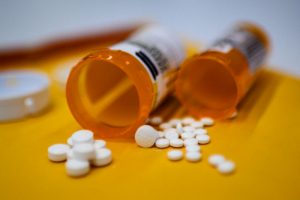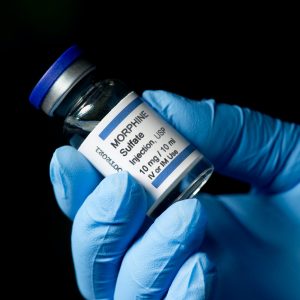Mixing Beer With Opioids
If you’re taking opioid-derived painkillers like oxycodone, morphine, and hydrocodone, then never mix that with alcohol drinking. Combining these two is dangerous since beer or alcohol can intensify the side effects of opioids.
For your safety, be sure to check with your doctor about your drinking habits if you’ll be taking pain medicines for certain treatments.
Let’s go further about this and know the possible health consequences when you mix these two substances.
What are Opioids?
Opioids are sourced from opium poppy where its main medical benefit is to relieve moderate to extreme pain. If it’s a prescription opioid then you call it painkillers, while for illicit ones, that’ll be heroin.
It’s a Schedule I controlled substance, so its consumption is regulated due to its addictive potential.
Generally, there are three kinds of opioids, including prescription opioids, synthetic ones, and illegal street drugs. In line with this, here are some of the common prescription opioids in the market.
 Oxycodone
Oxycodone- Morphine
- Fentanyl
- Hydrocodone Ibuprofen
- Methadone
- Tramadol
- Carfentanil
- Buprenorphine
- Meperidine
What are the common side effects of Opioids?
Despite its pain-relieving benefits, you’ll also feel mild side effects from taking this medication, the main reason why you need your doctor’s prescription when using this drug.
Below are the main side effects of these pain-relieving medicines:
- Slowed speech
- Vomiting
- Lightheadedness
- Smaller pupils
- Slower breathing and pulse rate
- Nausea
What are the common side effects of Alcohol and Beer?
Beer or any alcoholic beverage is a natural depressant, that’s why you need to be careful with your drinking sessions. Generally, the more alcohol in your body, the more intense will be its side effects, which include the following:
- Slowed speaking
- Diarrhea
- Feeling dizzy
- Inability to drive, walk, or stand
- Distorted vision and hearing
- Blackouts
- Inability to decide and think properly
- Having a cold and clammy skin
- Looking pale
What Happens When You Mix Beer and Opioids?
Beer or any alcoholic content can amplify the side effects of many drugs, making it a deadly combination with opioids. Considering that, you must never mix beer and painkillers, or else, you’ll experience these serious side effects:
- Intense sedative effect
- The respiratory system can stop
- Blackouts
- Coma
- Depressed heartbeat
- Numbness
- Unstable heart rate
- Sudden death
Specifically, a slower breathing pattern is one of the most critical side effects when you mix beer and opioids. All parts of your body, especially your brain, require enough oxygen to function properly.
When your lungs are severely depressed due to mixing these two substances, there’s a greater risk that your brain will have irreparable damage due to insufficient oxygen supply.
Additionally, when you’re intensely intoxicated with alcohol while under opioid medication, there’s a chance that you’ll be put into a coma or sudden death since your organs quickly stopped working.
Oxycodone and Alcohol
 These two substances are depressants where the beer amplifies the sedating effect of this opioid substance. Conversely, oxycodone is used to alleviate pain for around 12 hours, yet it has the following side effects:
These two substances are depressants where the beer amplifies the sedating effect of this opioid substance. Conversely, oxycodone is used to alleviate pain for around 12 hours, yet it has the following side effects:
- depresses breathing and pulse rate
- Confusion and dizziness
- Vomiting and Nausea
- Elevated pressure at the spine and brain
Besides that, oxycodone has a slight euphoric effect, making it highly addictive for everyone.
Consequently, when you mix beer and oxycodone, it will lead to an intensely slowed respiratory function, which can affect both your heart and brain.
In the US, around 88,000 people die due to alcohol-related complications, where 130 of them have used oxycodone.
Morphine and Alcohol
 Morphine is part of the opioid drug class where it’s mainly used for treating non-surgical pains. Likewise, it also induces a euphoric sensation for the patient, so it’s highly addictive.
Morphine is part of the opioid drug class where it’s mainly used for treating non-surgical pains. Likewise, it also induces a euphoric sensation for the patient, so it’s highly addictive.
If you’re medicating with morphine, then it’s never advisable that you’ll drink any alcoholic beverage since it can intensify its depressing effects. Additionally, it will amplify the following side effects of both drugs:
- loss of body coordination
- Blackouts
- Slowed responses
- Difficulty breathing
- Very low pulse rate
Methadone and Alcohol
 It’s another opioid painkiller substance that is usually used for alleviating any discomfort during your detoxification from heroin addiction. Typically, it works on your brain so that your pain receptors are blocked.
It’s another opioid painkiller substance that is usually used for alleviating any discomfort during your detoxification from heroin addiction. Typically, it works on your brain so that your pain receptors are blocked.
Conversely, mixing beer or alcohol with methadone is a bad idea since it can lead to serious brain and organ damages due to insufficient oxygen supply.
Furthermore, here are some detailed side effects for mixing these two substances:
- Inability to control voluntary movements
- Depressed reflexes
- Distorted Decision-making process
- Intensely slow breathing and pulse rate
- Cold and sweaty skin
- Subsequent seizures
- Blackouts
Fentanyl and Alcohol
 Did you know it’s more dangerous to mix beer or alcohol with fentanyl? Well, that’s because this is a synthetic opioid, and it’s 50x more potent than those natural opioids used in the industry.
Did you know it’s more dangerous to mix beer or alcohol with fentanyl? Well, that’s because this is a synthetic opioid, and it’s 50x more potent than those natural opioids used in the industry.
Having said that, it’s frequently used for relieving pain after surgeries. Nevertheless, it has side effects like other opioids which are further heightened when mixed with alcoholic beverages.
Additionally, some of the serious side effects of mixing alcohol and fentanyl are unstable heart rate, depressed respiratory function, impaired judgment, and uncontrolled vomiting.
Heroin and Alcohol
 Heroin is an illicit substance made from morphine which is an opioid substance. Practically, it’s a bad idea to mix beer and heroin since both are strong depressants with euphoric sensations.
Heroin is an illicit substance made from morphine which is an opioid substance. Practically, it’s a bad idea to mix beer and heroin since both are strong depressants with euphoric sensations.
Each of these substances has its respective side effects, which are elevated when the two are used by the person simultaneously. In general, below are the serious health consequences when you mix these substances.
- Severe drowsiness can lead to coma or sudden death
- Frequent and uncontrolled vomiting
- The inability of your lungs to function well
- Extreme mood shifts
- Unstable heart rate
Need Professional Help with Your Alcoholism and Addiction?
It’s never easy to overcome your alcohol dependence and opioid addiction, so you need external help from medical practitioners. Considerably, you need to seek a doctor or an addiction specialist since they have the knowledge, skills, and experience to help you achieve sobriety.
Besides, you can also search for a reputable rehab facility near you, which is fully equipped with the right personnel and tools for this matter. Likewise, they have a homey and friendly ambiance, which will give you sufficient support in your journey towards sobriety.
